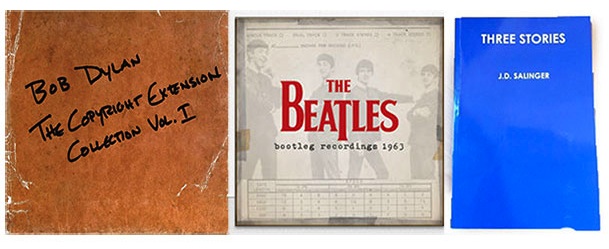
by H.B. Koplowitz
Thanks to Europe and Internet piracy, rare early works by three cultural icons of the Baby Boomer generation — The Beatles, Bob Dylan and J.D. Salinger — have recently become more available to the public.
On Dec. 17, “The Beatles Bootleg Recordings 1963,” consisting of 59 unreleased Beatles outtakes, demos and BBC sessions, were put on sale at the online iTunes store. Days earlier, 73 studio outtakes and live concert and club performances by Dylan, also from 1963, were discreetly released in Europe, after which pirated versions began showing up online. And just before Thanksgiving, three pre-“The Catcher in the Rye” short stories written in the 1940s by the late reclusive author J.D. Salinger found their way onto the Internet.
The New York Times reported that both the Beatles and Dylan tracks were released by their record companies to stop them from becoming public domain. European Union copyright law protects officially released recordings for 70 years, but only 50 years for unreleased versions.
Bootleg versions of the Beatles cuts have been around for years, but never officially released. They include BBC performances in which John, Paul, George and Ringo banter with the host and take phone requests. Many of the BBC tracks are also on the recent “On Air” two-CD set. All the tracks were made before 1967, when the group went psychedelic with “Sgt. Pepper’s Lonely Hearts Band,” and they reveal more about the musicians’ influences than what they would become, with a lot of American rock ‘n’ roll, blues, country, even The Everly Brothers.
“Beatles Bootleg” is available exclusively at the iTunes store for $40, or $1.30 per song. It was rumored the album would only be offered long enough to establish the release, but Apple has issued a statement saying it will remain for sale indefinitely.
The Dylan songs were all performed before he strapped on an electric guitar at the Newport Folk Festival in 1965, and include multiple versions of protest songs with just him, an acoustic guitar and a harmonica. The Times described the collection as “virtually all unreleased performances of value from 1963,” including outtakes from Dylan’s third album, The Times They Are a-Changin’, and appearances on the Oscar Brand Show, Studs Terkel’s Wax Museum, and at Town Hall, Carnegie Hall and the Gaslight Cafe in Greenwich Village. But Sony Music distributed just 100 copies of Dylan’s 50th Anniversary Collection, on vinyl and in Europe, and it is not for sale on iTunes, Amazon or other music outlets.
According to The Times, Sony tried a similar strategy last year with 86 of Dylan’s unreleased recordings from 1962, distributing 100 four-CD sets outside America, and making no bones about why it was issuing the material, subtitling the bootleg dump The Copyright Extension Collection. However, rippers soon put both sets on the Internet, in uncompressed audio as well as high quality mp3, that can be downloaded for free, albeit illegally, using file-sharing applications such as BitTorrent and Frostwire.
The unauthorized leaking of three short stories by J.D. Salinger is another kettle of bananafish. Two of the stories, “Paula” and “Birthday Boy,” could only be read in person and under strict supervision at the Harry Ransom Center at the University of Texas. The third, “The Ocean Full of Bowling Balls,” is housed in a special reading room at the Firestone Library at Princeton University. According to the social news and entertainment websites BuzzFeed, Reddit and The Daily Beast, Salinger’s will — and his agreement with the research libraries — instructs that the stories not be published until 50 years after his death, at age 91, on Jan. 27, 2010.
However, the day before Thanksgiving, an unidentified person who claimed to have purchased Three Stories for about $110 from a British eBay auction, uploaded 41 scanned images of the paperback book to file-sharing websites. The uploader said the book was printed in London in 1999 and that it was copy number six out of 25 copies. Kenneth Slawenski, author of J.D. Salinger: A Life, who has read the stories in the research libraries, told BuzzFeed the online versions appear to be authentic.
“While I do quibble with the ethics (or lack of ethics) in posting the Salinger stories, they look to be true transcripts of the originals and match my own copies,” Slawenski e-mailed BuzzFeed.
The stories appear to be rough drafts and have typos and uneven formatting, and while light in tone, the plots are gloomy. “Paula” is about an infertile woman who tells her husband she is pregnant. “Birthday Boy” is about a hospitalized alcoholic whose fiancee won’t give him a drink. The most tantalizing of the three is “The Ocean Full of Bowling Balls,” which serves as a prequel to “Catcher in the Rye,” describing the last day of Kenneth Caulfield, whose name was changed to Allie in “Catcher,” and whose death would traumatize his older brother Holden. In setting and theme, “Bowling Balls” is also similar to Salinger’s “A Perfect Day for Bananafish,” with Seymour Glass dying at the end instead of Kenneth Caulfield.
Download websites such as MediaFire have since deleted Three Stories, but it can still be downloaded with file-sharing apps.
The exceedingly private and litigious Salinger may be spinning in his grave, and the record companies may be annoyed that their efforts to keep the early Beatles and Dylan rarities out of the public domain have come to naught. But as The Times noted, “Are these releases, by being so severely limited, inadvertently abetting the bootlegging that labels usually try to stop?”
However one feels about the ethical issues, the culture is richer for these seminal works becoming more widely available.
